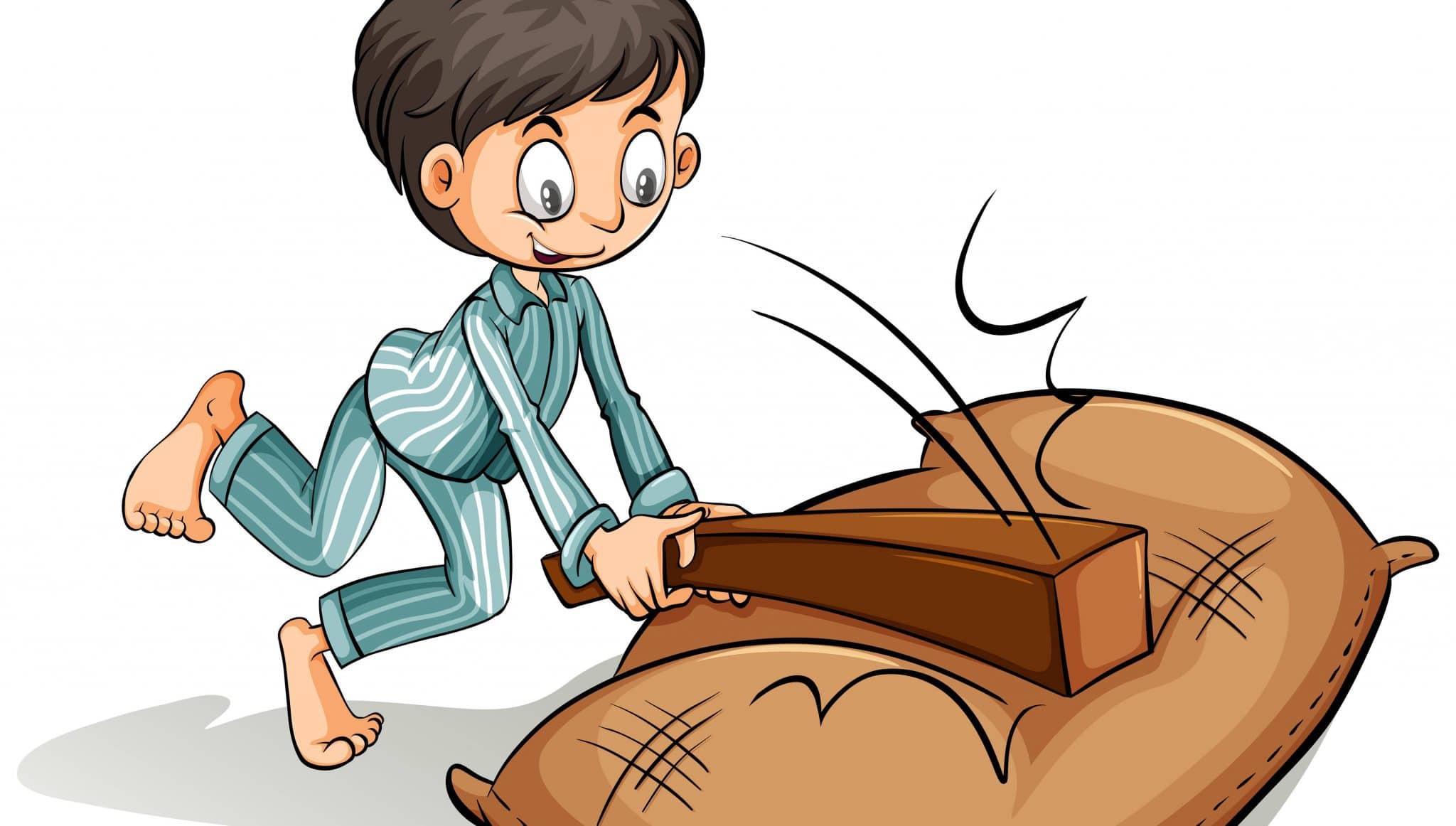Oral communication between people has evolved considerably over the years. Formal language learned academically from school has had to incorporate into its codes expressions coined outside the classroom, created thanks to popular wisdom and its collective desire to make a message based on a real need that immediately connects with as many receivers as possible.
“Hit the sack” means that it is time to go to sleep. Although it is a colloquial phrase, its use in contemporary writing is becoming more frequent in sentences to emphasize that someone is retiring for the night. It is one of those expressions that society has adopted into its informal language.
It is amazing how expressions apparently simple in structure and vocabulary hide a background with so much depth, usefulness and versatility at the same time, demonstrating with tangible facts that popular culture is much wiser than we think and that each of its creations has transcended time, borders, idiosyncrasies and even languages themselves. The invaluable contribution that these expressions make to society is their profound capacity to connect with the genuine feelings of the common people, without masks or false appearances.
The Origin Of The Phrase “Hit The Sack”

Unlike other colloquial expressions that do have their origins recorded with moderately verified data and with acceptable and tangible evidence indicating the date of first use, cause of its creation, and some peculiar anecdotes, the phrase “hit the sack” on the contrary, does not have so much determinant and precise information that relates it to the origin of its birth. Only speculative stories of uncertain verisimilitude can be found, giving its creation and its varied versions a significant air of urban legend mixed with popular mythology.
This reality about the veracity of the origin of “hit the sack” does not prevent us from finding some diverse stories related to the coining of this expression. For this reason, the versions that are most repeated today will be explained below.
- One of the most widespread versions states that the phrase originated in the United States in the late 19th and early 20th centuries. At that time, people of very low income used to sleep in a cloth sack stuffed with hay. The truly anecdotal part of this story lies in the fact that even though the hay-filled sack served as a mattress, it was still a haystack, so people would shake and beat the sack before going to bed to make the “mattress” softer and more comfortable, as well as to make sure there were no insects inside. This version of the origin of the expression “Hit the sack” is the most popular and the one that is given a greater degree of veracity with respect to the following versions that we will review.
- The Oxford English Dictionary places the phrase in the year 1943 when James J. Fahey’s Diary of the Pacific War writes the following sentence: “I hit the sack at 8 P.M. I slept under the stars in a steel ammunition box two feet wide.”
- The Oxford English Dictionary also mentions that the phrase appeared in 1912 in the Dialect Notes, being used in practically the same way as it is used today. The published phrase was: “Hit the hay, to go to bed,” in this case, “Hit the hay” means the same as “Hit the sack.”
- Another reference to the origin of the phrase “Hit the sack” dates back to 1825, the expression being a nautical term used by sailors at that time when referring to going to bed.
- In France, the expression “Hit the sack” is used but with a significantly different interpretation. This idiomatic expression refers to a metaphorical plundering of the sleeping room or bed, that is, the phrase is interpreted as plunder or struggle between husband and wife for the capture of pillows, sheets, or blankets for each other’s side, in other words, it is a phrase that alludes to a situation where a “stretch and shrink” is presented.
- Some historians suggest that prior to 1880, the action of hitting the hay and hitting the sack comes from life in agricultural areas such as farms and barns. This occurred mainly in places where hay was stored, as in the evenings, these warehouses became the sleeping quarters for farm employees or laborers. So widespread was this action in many areas that by 1900 “Hit the sack” came to mean going to bed wherever someone was
- During World War II, American soldiers began to refer to their sleeping bags as sacks, which evolved into the expression known today. However, this origin is one of the least verifiable of all those previously reviewed.
How People Use The Phrase “Hit The Sack”

Although the meaning of this phrase initially seems very simple, people have assigned many more interpretations to it than one might imagine. This indicates how amazingly versatile this phrase is and its wide adoption in multiple aspects of people’s daily lives. Below we will look at some of these uses:
- To indicate an action to be performed before going to sleep
- To indicate the way to take medicine before going to sleep
- To indicate that it is time to stop a burdensome activity and go to sleep to recharge batteries
- To indicate that it is time to go to sleep early because the next day you have to get up early
- To indicate the moment when the time change occurs in a certain geographical area and the need to adjust the clocks before going to sleep.
- To indicate the scheduled sequence of activities of the day that occur before going to sleep.
- To evoke a memory or memorable event that happened before going to sleep
- To express that several things must be done quickly in order to go to sleep
- To indicate when someone knows they should go to sleep, but their mind is still thinking about various matters that were left pending
- To express when someone reminds someone else of what to do before going to sleep
- To express the hope of going to sleep to improve some physical discomfort
- To express some physical workout routine that occurs before going to sleep
- To indicate that going to bed is not a good idea when things are left unfinished
- To refer to modifications in the pattern of bedtime
- To indicate to someone the exercises he/she must perform in order to go to sleep
- To describe situations that occur simultaneously while someone is sleeping
- To indicate the performance of various tests that should work before going to sleep
- To indicate that one is lying awake waiting for someone to go to sleep
- To indicate that someone should abstain from the consumption of some product or drink a few hours before going to sleep
- To express the daily routine of a famous person before going to sleep
- To establish the time to go to sleep as a goal to be achieved if certain tasks are completed
- To indicate the interruption of some activity due to falling asleep
- To indirectly determine the time of occurrence of an event by calculating it by the time of going to bed
- To indicate that something planned did not occur because of going to sleep
- To disqualify someone by referring to the fact that he/she is only interested in going to sleep
- To mention the time someone goes to sleep as an example to be followed by others
- To indicate the loss of health of someone who does not sleep well
- To indicate when a sporting event is taking place in one country while people are sleeping in another
- To give bedtime recommendations depending on the weather season
- To indicate demanding work schedules and the ideal time to go to sleep
- To acknowledge the bedtime of some infants or young children
- To indicate how certain metabolic processes in the body can affect bedtime
- To express the need to reduce the level of stress and anxiety to be able to go to sleep
- To indicate the culmination of strenuous work and to mark the time to go to sleep
- To express some long-awaited and positive events that will occur after going to sleep
Examples Of The Use Of The Phrase “Hit The Sack” In Everyday Sentences
Everything related to the idiomatic expression “Hit the sack” has been explained in-depth, demonstrating the richness of its message and the wide range of uses that this simple phrase contains behind its words. It only remains to see some concrete examples that contribute to its correct interpretation.
- Tomorrow I have to get up early to go to the airport, so I’m going to sleep in
- What time did you go to bed last night after finishing that important work?
- I’m bored with this meeting. Let’s get out of here and go to sleep
Conclusion

Surely you were surprised by the versatility of the phrase “Hit the sack,” and it is not for less, and that is where the inexhaustible value of idiomatic expressions lies, in drawing in people’s minds indelible images that connect and identify them with real and everyday situations that many times will be better expressed and understood with these phrases than with formal and academic language attached to all linguistic rules. Preserving our idiomatic expressions is the small contribution that each one of us can make in favor of the popular culture of society.
More like this post:
- What Does “A Little Learning Is A Dangerous Thing” Mean?
- What Does “A Snowball Effect” Mean? When Can We Use It?
- What’s the Meaning of “A Snowball’s Chance in Hell”?
Shawn Manaher is the founder and CEO of The Content Authority. He’s one part content manager, one part writing ninja organizer, and two parts leader of top content creators. You don’t even want to know what he calls pancakes.

